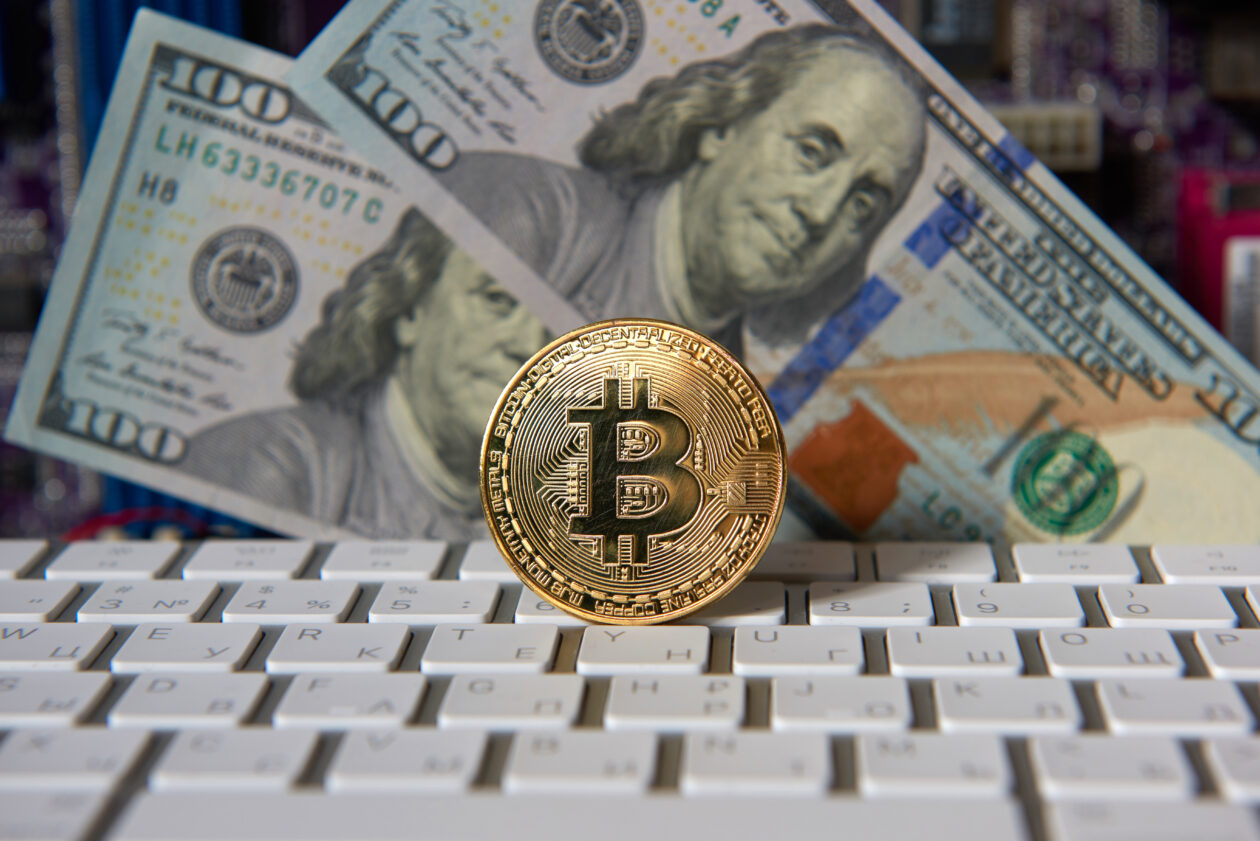Bitcoin fell in Wednesday afternoon trading in Asia but is still holding above US$30,000 on market positivity as more traditional financial institutions show interest in digital assets and plan on introducing Bitcoin exchange-traded fund (ETF). Ether and all other top 10 non-stablecoin cryptocurrencies fell in the past 24 hours.
See related article: Sony Network Communications to invest in Japanese Web3 developer Startale Labs
Crypto stumbles, investor optimism endures
Bitcoin fell 0.76% to US$30,178 in the 24 hours to 4 p.m. in Hong Kong, the smallest drop among other top 10 cryptos, according to data from CoinMarketCap. The world’s largest cryptocurrency by market capitalization is up 4.54% over the past seven days.
“Bitcoin has benefitted from the U.S. banking confidence crisis earlier this year and the [Securities and Exchange Commission’s] lawsuits [against crypto exchanges] as well as the enthusiasm around the potential launch of a Bitcoin ETF,” Denys Peleshok, head of Asia at London-based financial trading firm CPT Markets, said in an emailed statement on Tuesday.
“Bitcoin ETF applications have supported investors’ sentiment as institutional and retail investors show increasing interest in the market through such investment vehicles. If the SEC approves new applications, the market could record a surge in demand and in the number of buyers,” Peleshok added.
According to Matteo Greco, research analyst at digital asset and fintech investment firm Fineqia International, it is the first time since February 2022 that Bitcoin is showing a positive delta on the year-on-year price metric. However, this alone does not confirm if the bear market is over.
“But the combination of good news at the macroeconomic level and the news concerning BTC adoption of institutions gave the market a boost to head towards a good Q2, following an already convincing Q1 in 2023,” Greco said in an emailed statement on Tuesday.
Ethereum, the second biggest cryptocurrency, dropped 1.30% to US$1,850 in 24 hours, but is up 2.10% on the week.
All other top 10 non-stablecoin cryptos fell on Wednesday afternoon trade with Solana leading losses. The token dropped 4.33% to US$15.97, bringing its weekly losses to 5.11%. Cardano’s ADA token dropped 2.32% to US$0.2761 in the past 24 hours, losing 0.81% on the week.
The SEC named several altcoins as financial securities, including Solana, Cardano, Polygon and BNB, in the week of June 5, while filing lawsuits against crypto exchanges Binance.US and Coinbase. Altcoin prices have taken a hit since then as investors’ funds seem to be flowing into Bitcoin.
More traditional financial institutions are venturing into the U.S. digital assets space. Fidelity is reportedly applying for a spot Bitcoin ETF in the U.S., according to crypto news site The Block. This follows a series of U.S. spot Bitcoin ETF applications submitted by asset managers earlier this month, including BlackRock, WisdomTree, Invesco and Bitwise.
Investor sentiment was further boosted by reports of banking giant HSBC offering Bitcoin and Ether futures ETFs on its “Easy Invest” mobile application. These investment products were listed on the Hong Kong Stock Exchange last December.
“We are happy to see more interest and demand in the digital assets space, but we would suggest that while ETFs are more convenient for many types of investors, that doesn’t make them better,” Michael Silberberg, head of investor relations at AltTab Capital, said in an emailed statement on Tuesday.
“BTC ETFs, including those now in Hong Kong, are all futures ETFs that have historically lagged the pricing upside of just holding BTC and taken larger downswings,” Silberberg pointed out.
Total crypto market capitalization dipped 1.03% to US$1.17 trillion, while market volume rose 4.76% to US$37.34 billion in the past 24 hours.
Azuki Elementals NFT disappoints
In the non-fungible token (NFT) market, the Forkast 500 NFT index dipped 1.05% to 2,860.44 in 24 hours to 5.45 p.m. in Hong Kong, bringing its weekly losses to 1.37%.
The Forkast ETH NFT Composite also dropped 0.84% to 979.43, part of a 1.65% seven-day loss.
NFT trading volume on Ethereum rose 307.62% to US$71.57 million in 24 hours, according to CryptoSlam data.
Solana overtook Bitcoin as the blockchain with the second-highest NFT sales volume over the past day. NFT sales volume on Solana rose 67.91% to US$2.73 million, while that on Bitcoin dropped 69.87% to US$1.51 million.
CryptoSlam’s top four collections by trading volume are all Azuki-related collections. Azuki Elemental Beans collection clocked sales of US$36.59 million in 24 hours, while Azuki Elementals recorded sales of US$8.93 million.
The main Azuki collection rose 1.84% to US$7.87 million, and Beanz rose 2.10% to US$2.52 million in 24 hours.
Elementals, an Azuki spin-off consisting of 20,000 NFTs, transacted nearly US$8 million in secondary action in the past 24 hours. Combined with the primary sale, and Azuki’s Beanz and Elemental Beanz sales, the Ethereum NFT ecosystem saw its best day in over one year, according to Yehudah Petscher, NFT strategist at Forkast Labs, the parent company of Forkast.News.
“However, collectors of Elementals aren’t just underwhelmed. They are angry. The collection’s art looks nearly identical to the original Azuki collection, leading many to believe the project has just devalued the ecosystem. The mint itself was a borderline disaster as well, though the 15-minute sell-out brought in US$38 million for the team,” Petscher said.
Azuki,
— Azuki (@Azuki) June 28, 2023
It's always both challenging & exciting opening up the gate to the Garden.
This time, we missed the mark.
We hear you – the mint process was hectic, the PFPs feel similar and, even worse, dilutive to Azuki.
Holders of Azuki NFTs were given a 10-minute presale mint, and the next 10 minutes opened up to Beanz holders. In the end, many Azuki holders were left stuck with a loading message and could not mint. Beanz holders were upset that very few were left for them, and no Elementals made it to public sale, Petscher said.
“This was all but a worst case scenario for NFTs as it shows little has been learned over the past few years, and projects seem to be focused on profits first, and maybe exclusively,” he added.
Asian equities mixed; European bourses gain

Asian equity markets showed mixed results on Wednesday, reacting to news that profits of industrial firms in China sank 18.8% year-on-year in the first five months of 2023, due to a slower-than-expected post-Covid recovery.
At the end of Asian trading hours on Wednesday, the Shanghai Composite remained unchanged while the Shenzhen Component dropped 0.47%. Hong Kong’s Hang Seng Index gained 0.12% and Japan’s Nikkei 225 strengthened 2.02%.
According to a Bloomberg survey of economists, the world’s second-largest economy is expected to cut its interest rates on one-year policy loans by 5 basis points to 2.6% in the last quarter of this year to boost economic growth.
U.S. stock futures mostly dropped as of 7 p.m. in Hong Kong, as the S&P 500 futures dipped 0.09%, and the Nasdaq 100 Futures fell 0.19%. The Dow Jones Industrial Average futures rose 0.06%.
Investors are looking forward to Federal Reserve Chairman Jerome Powell’s speech at events in Europe. Powell is set to speak at the European Central Bank Forum in Sintra, Portugal, on Wednesday and again on Thursday at the Banco de España Fourth Conference on Financial Stability in Madrid, Spain.
Last week, Powell said there may be more interest rate increases this year in the U.S., which are currently between 5% and 5.25%, the highest since 2006.
“U.S. equity investors today are being rewarded with a smaller return premium for bearing equity risk than at any time in recent memory, at a time when macroeconomic risks are high and central banks are in less supportive mood,” Duncan Lamont, head of strategic research at Schroders, said in an emailed statement on Wednesday.
“The U.S. may have been the strongest performing market for much of the past 15 years, but our analysis of the equity risk premium suggests that it will struggle to repeat that feat. Long-term investors may be better served by allocating more to non-U.S. markets in the decade to come,” Lamont added.
European equity markets strengthened on Wednesday, following Wall Street’s overnight rally on the back of rebounding home sales in the U.S. and strengthened consumer confidence.
The benchmark STOXX 600 gained 0.68% and Germany’s DAX 40 rose 0.88% during Wednesday afternoon trading hours in Europe.
Philip Lane, European Central Bank’s Chief Economist, indicated on Wednesday that stock markets should not factor in interest rate cuts in the next two years.
The central bank has been increasing interest rates since last year, amounting to 400 basis points of raises so far, with market expectations of two more rate hikes later this year.
(Update adds NFT and equity sections.)






